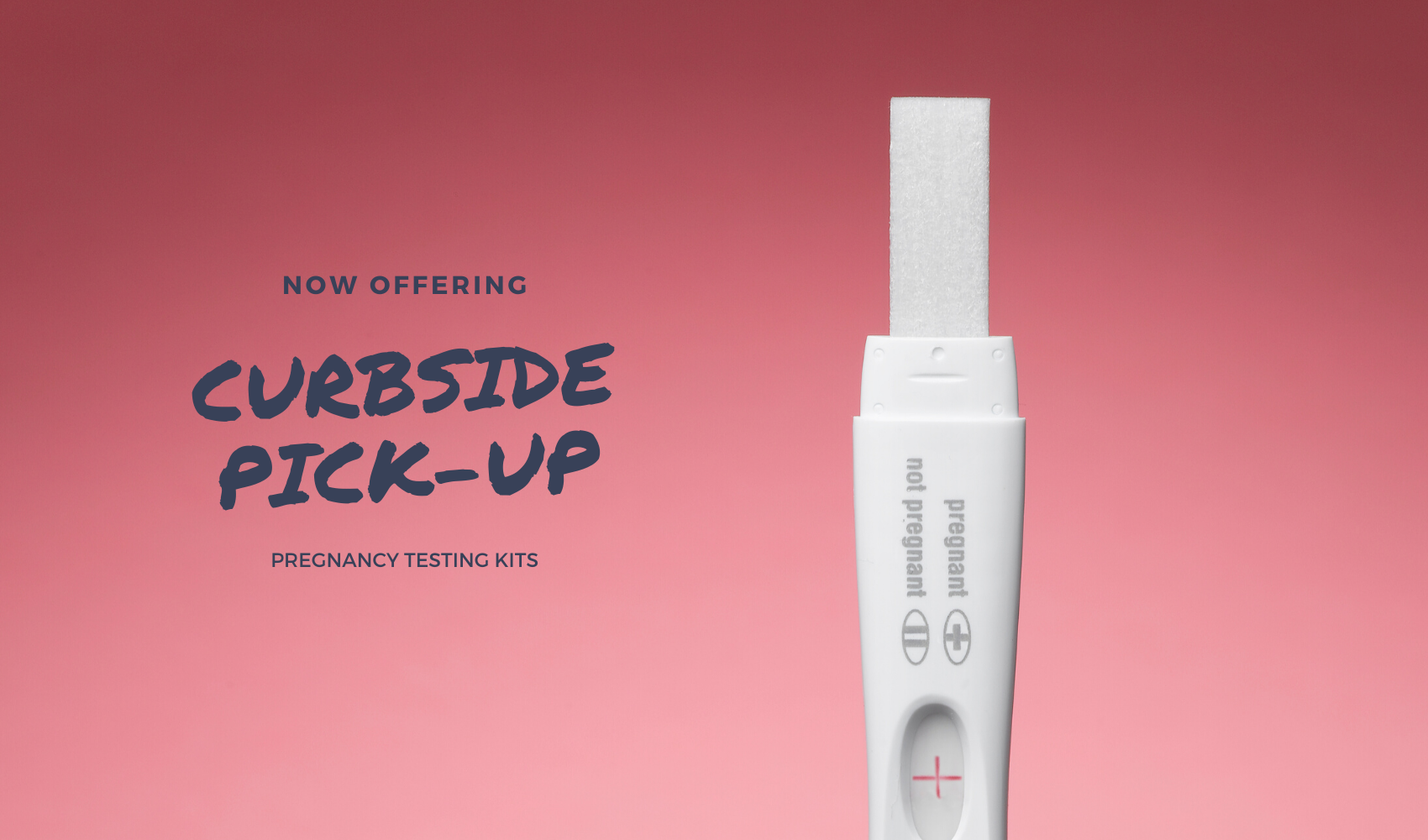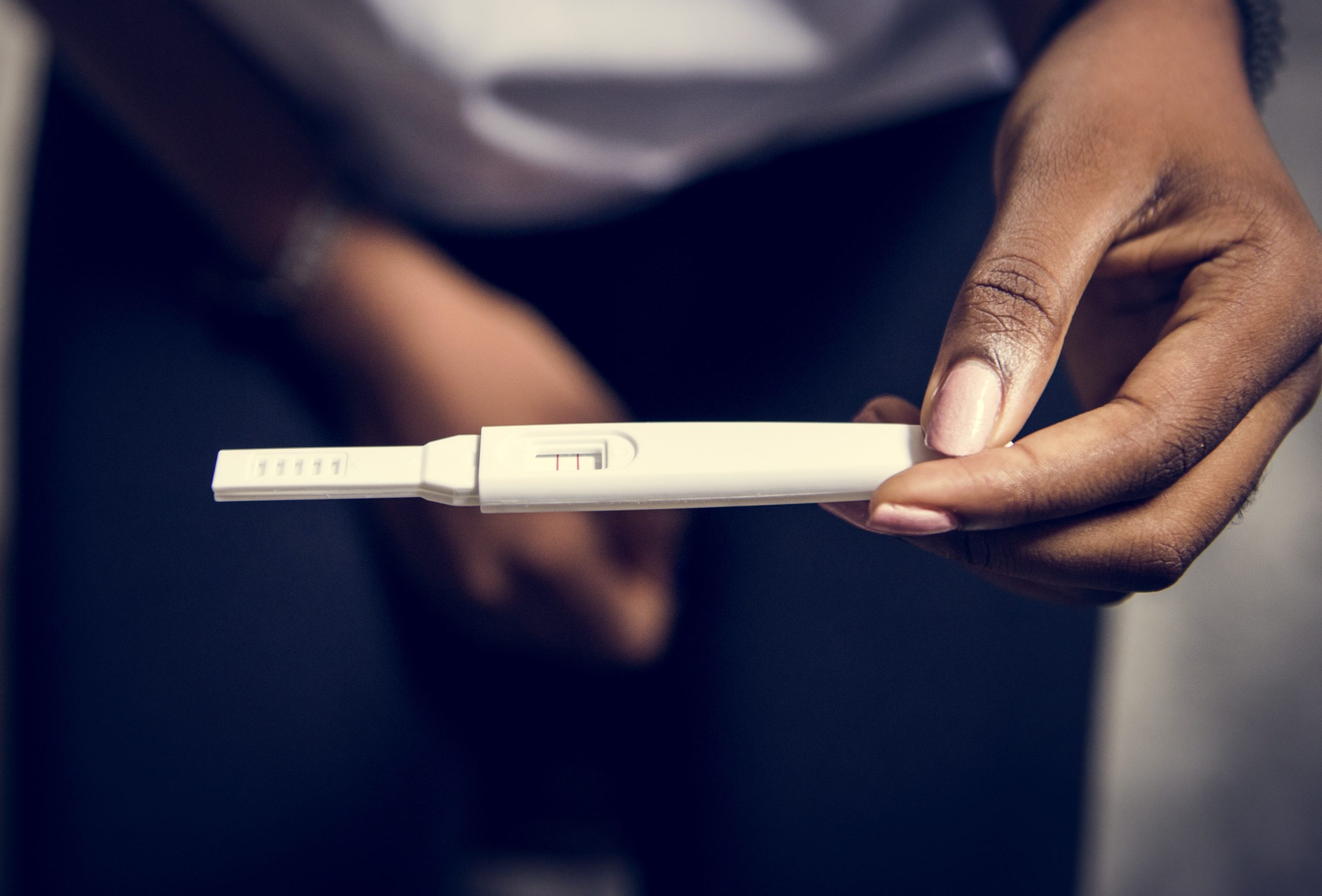
Now Offering: Curbside Pregnancy Testing Kits
Our free pregnancy testing kit contains all of the supplies you will need to conduct a test at home, including a lab-quality test and video instructions provided by our medical team.
If you have a positive pregnancy test result, we can provide you with additional resources and information based on your needs and plans. First Care Pregnancy Center has caring staff available to help you process your test results and learn about your options. Same-day phone or virtual counseling sessions are often available.
How to Schedule
To arrange for pick-up of a pregnancy testing kit, schedule an appointment online or call the office location near you. Slots are available every 15 minutes for pick-up during regular office hours.
When you arrive for pick-up, please call us by phone to let us know you are here. We will leave your kit in a box just outside the door allowing you to pick it up in a touch-free manner.
If you have any questions regarding this service or others offered by First Care, please text or call us at (612) 712-6253.
Learn More

Your Pregnancy Part 3: The Third Trimester
Congratulations! You made it to the third trimester! Common feelings include nervousness and also excitement about your upcoming birth and parenthood. Rest assured, these are all normal feelings.
The third trimester will take you from week 28 through week 40 of your pregnancy. During the third trimester, you may notice some changes due to your growing baby and your body preparing for birth.
Here are few common changes you may notice during this final trimester:
- Abdominal aches: These aches could be caused by round ligaments stretching to accommodate your growing baby bump and preparing your body for birth..
- Fatigue: As baby grows to full-term, the demands baby puts on your body increase. Be sure to get lots of rest.
- Heartburn: As your uterus pushes your stomach upwards, you may notice an increase in heartburn. Talk to your doctor if it is bothersome or severe.
- Contractions: Braxton Hicks contractions may start as your body prepares for the birth of your baby. These contractions are irregular and usually mild. True contractions will be progressive, increasing in frequency and intensity. Be sure to call your doctor if you can time the contractions and they become painful.
- Stretch marks: Stretch marks typically appear due to genetics. Moisturizing your belly may help minimize their appearance.
- Generalized discomfort: As the baby continues to grow, some women will experience backaches, shortness of breath, urinating frequently or other discomforts.
- Breast changes: Some women notice their breasts feel very full and begin leaking towards the end of their pregnancy. This substance is called colostrum, and it’s common to notice some leaking even before the baby is born. Colostrum is very nutrient-dense and will be a wonderful source of nutrition when your little one arrives.
Your baby is also going through many changes during the final trimester to help prepare for birth and life outside the womb.
Here are a few notable milestones:
Weeks 29-32:
- Baby weighs between 2-4 pounds
- Rapid brain development that enables baby to regulate body temperature and have rhythmic breathing movements
- Lanugo (fine hair all over baby’s body) starts to disappear, and the hair on baby’s head starts to thicken
- Your baby gains more fat stores, and bones are fully developed (although still soft)
Weeks 33-36
- Baby’s eyes are able to be wide open, and pupils are responsive to light
- Fingernails have grown to reach the tip of the fingers
- Lungs continue to develop and prepare for independent breathing
- Multiple separate bone plates in her skull that are able to slide and move to allow the baby to pass through the birth canal
Weeks 37-40
- Baby is rapidly gaining weight! Expect your baby to gain about ¼ to ½ pound per week in the last few weeks of pregnancy.
- Baby drops lower in mom’s belly and is typically positioned head-down to get ready for birth!
Even though there can be many discomforts and physical demands during a pregnancy, we hope you have enjoyed bonding with your little one even before he or she is born! Every woman’s experience of pregnancy is different, so if you have any concern if something you are experiencing is “normal,” we always encourage you to reach out to your prenatal provider.
Be sure to join us for a birthing class as you prepare for delivery!
We hope this blog series has given you a glimpse of some of the changes you and your baby may encounter from conception to birth!
Learn More
Am I Pregnant? Take This Online Test
Have you missed your period by a couple days and wondering if are pregnant? Answer the questions below and note how many you answer “yes” to.
- Have you missed a period?
- Are you more tired than usual?
- Have you lost weight?
- Do you have to pee more often?
- Do your breasts feel swollen, sore or tender?
- Have you gained weight?
- Do you feel like throwing up?
- Are you experiencing headaches?
- Are you having mood swings?
- Do you feel dizzy?
- Have you noticed a change in your appetite?
If you answered yes to at least four of these questions, there is a chance you could be pregnant.
The only way to know for sure is to take a pregnancy test. First Care provides free lab-grade pregnancy testing and ultrasounds which can verify pregnancy and help determine how far along you are.
Even if you have taken a positive home test, we can confirm your pregnancy and provide information on your options. Our staff are trained to help you navigate your potential pregnancy and connect you to resources you may be in need of.
Schedule an Appointment
Your next step? Contact us by text or phone at 612-712-3974. Or schedule a confirmation pregnancy test online.
Learn More
Tips for Managing Pregnancy as a College Student
Becoming pregnant while pursuing a college education can seem like a huge roadblock but it doesn’t have to be. With some tips for managing pregnancy as a college student you can be successful. If you’re a student in the Twin Cities at the University of Minnesota, Hamline, St. Thomas, Augsburg, Macalester, or St. Catherine University, you can find support and help through our centers.
At First Care, we will help connect you with resources in the community in addition to helping you identify available resources at your school.
Here are some of our tips to help manage pregnancy as a college student:
Gain a shift in perspective.
As we all grow and mature in life, it is important to realize that hard, difficult, challenging and unexpected things will ALWAYS be a part of life. They are unavoidable and that is not meant to be discouraging. Rather, it is intended to help you see the strength and capability you have within yourself to press on in the midst of unexpected challenges.
Who is in your corner?
I like the metaphor of a boxer who may have thousands of cheering fans but only a select few people in her corner, walking alongside her each step of the way. Take a moment to think about the people in your corner; who is there to support you through this pregnancy? Family, friends, partner? If you don’t have enough support, our Client Care staff can help you widen your support base.
Utilize Resources
Another key aspect in managing your pregnancy is recognizing any material or financial support you might be needing. This could be baby/maternity supplies, getting connected to programs like WIC, education classes to help prepare you or parenting groups for support.
- The U of M has a Student Parent Help Center that helps students who are pregnant and/or parenting with a variety of resources and support such as: child care resources, family housing, lactation resources, Parents As Students Support Group, Family friendly activity and events list, Teen Parent Outreach Program, and scholarships.
- The University of St. Thomas provides numerous resources to assist pregnant and parenting students.
- The Jeremiah Program provides services for pregnant women who want to pursue or continue their education and/or workforce prep.
We can help you gain access to all of these resources and more.
Believe In Yourself
Recognize you can do both – carry a pregnancy to term and be a student. It may look different than expected but, becoming pregnant does not mean you cannot continue your education. A lot of colleges have resources for pregnant students and want to help you through this as well. We encourage you to talk with your professors and advisers to make a plan for what this can look like.
Often with holistic support, women who experience an unplanned pregnancy realize they are stronger than they know and can move from surviving to thriving in their situations.
Remember you are not alone, not the first person to be experiencing this and you are so capable to get through this season of life.
Schedule an Appointment
Connect with one of our Client Advocates today to learn how we can specifically help you!
Learn More
STD Awareness Month: What You Need to Know About Chlamydia and Gonorrhea
This post provides information regarding two of the most common sexually transmitted infections (STIs) present today: Chlamydia and Gonorrhea.
Imagine this: You’re scrolling through your phone and you see a text pop up that makes your heart drop. It’s your ex, and you’re told you need to get tested because your ex has Chlamydia. Your head starts swimming with emotions and questions: How could he or she do this to me? Am I going to be okay? Where do I go from here?
While the above scenario may not describe your exact experience, we know that you may have questions without knowing who to ask.
The Facts
Chlamydia and gonorrhea are both bacterial infections that are transmitted through sexual contact. This can be any form of sexual contact, whether vaginal, anal, or oral sex. These infections can also be passed to a baby during childbirth if the mother has an active infection.
Chlamydia and gonorrhea are very common STIs. According to the Center for Disease Control (CDC), about 1 out of every 20 sexual active women between the ages 14-24 has chlamydia. Additionally, over 1 million new gonorrhea cases are estimated to occur in the United States each year (CDC, 2016). In Minnesota the rates continue to rise for both STDs with a record number of cases in 2019.
One of the concerning aspects of both chlamydia and gonorrhea is that often times, men and women don’t experience symptoms. If symptoms do occur, they may include burning with urination or discharge from the site of infection. If left untreated, these infections can cause serious complications.
Treatment
If you do test positive for chlamydia or gonorrhea, you will need to receive antibiotics for treatment. Chlamydia is treated with a one-time dose of an oral antibiotic. Gonorrhea has become resistant to some antibiotics and therefore requires two different antibiotics for treatment. This includes pills and an injection. You will also need to notify any current and past partners that may have come in contact with the infection so they can be tested and treated.
You may think, “Since these infections are easily treated with antibiotics, it’s not a big deal if I test positive!” While it is true that these infections are treatable, there can be serious long term consequences, especially with repeated infections or having an infection that goes untreated for a long time. Some of these complications include pelvic inflammatory disease, scarring in the fallopian tubes leading to infertility, ectopic pregnancy (a medical emergency where an embryo implants outside of the uterus), and long term pelvic pain. (CDC, 2016).
Prevention
So how can chlamydia, gonorrhea, and other STIs be prevented? According to the CDC, the best way to prevent contracting an STI is to “abstain from vaginal, anal, and oral sex, or to be in a long-term mutually monogamous relationship with a partner who has been tested and is known to be uninfected” (CDC, 2016). We also understand that in some situations, contracting an STI was not something that could be prevented, like in instances of unwanted sexual contact.
Testing
If you are concerned about a potential STI, we are here to help. First Care has a safe and confidential environment for you to process your unique situation and receive accurate testing with licensed staff. Testing and treatment are provided at no cost at our centers (no insurance required either)
Schedule an Appointment
Call one of our locations to schedule an appointment or schedule online at any time.
All data retrieved from the CDC website:
Learn More
